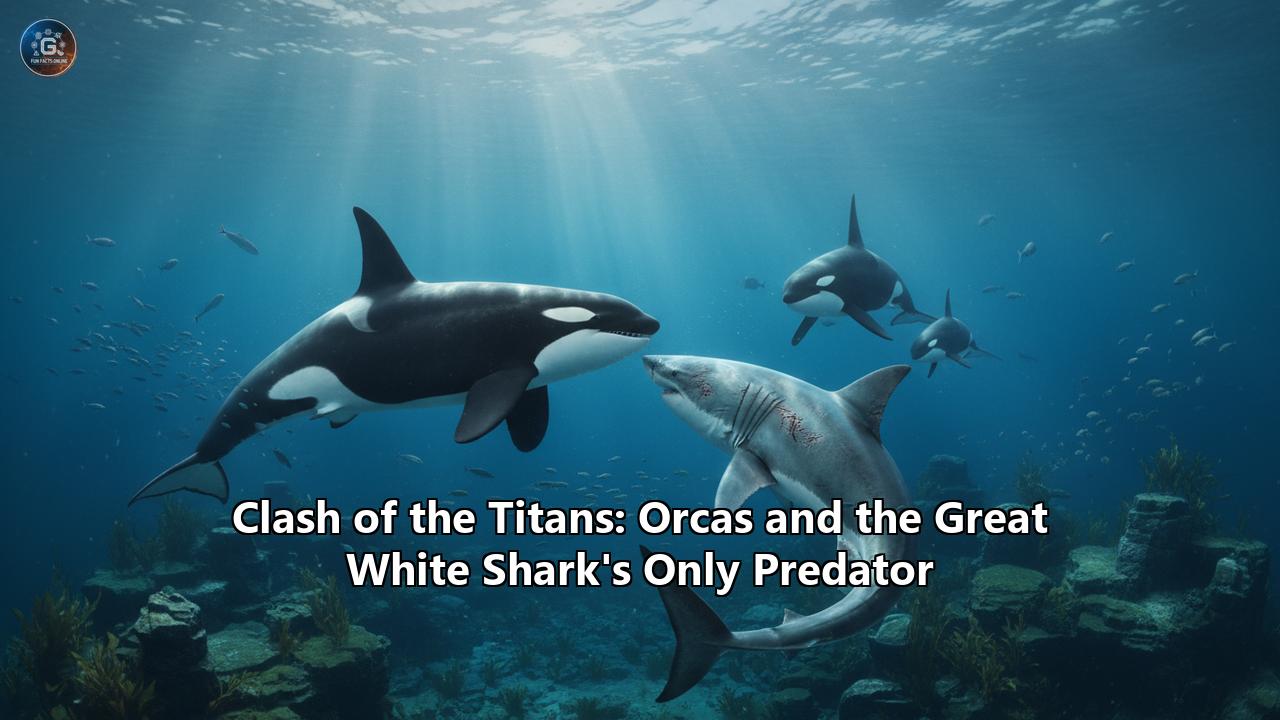In the vast, blue expanse of our planet's oceans, a battle of apex predators is unfolding, challenging long-held beliefs about the marine food chain. The great white shark, for so long the undisputed ruler of the seas, has met its match. This is the story of the clash of titans, a dramatic power shift where the only known natural predator of the great white shark, the orca, has demonstrated its formidable prowess.
The New King of the Ocean
For decades, the great white shark (Carcharodon carcharias) has been an icon of marine power, a perfectly evolved predator at the very top of the oceanic food web. However, recent and startling observations have revealed a superior hunter, a predator that instills fear in the heart of the great white: the orca (Orcinus orca), also known as the killer whale. These highly intelligent marine mammals are the only known predators to systematically and successfully hunt great white sharks.
The evidence, gathered from the coastal waters of South Africa to the Gulf of California in Mexico, is as dramatic as it is conclusive. Scientists have documented orcas, with astonishing strategy and coordination, taking down the ocean's most feared fish.
A Tale of Two Hotspots: South Africa and Mexico
The narrative of this epic confrontation has largely been written in two key locations: the waters off South Africa and, more recently, the Gulf of California.
South Africa's Reign of TerrorOff the coast of South Africa, a pair of male orcas, aptly named Port and Starboard by researchers, have become infamous for their great white hunting escapades. Since 2017, their presence has been linked to at least eight great white shark carcasses washing ashore, with evidence of their grisly work. The attacks have been so effective and terrifying that they have caused a mass exodus of great white sharks from their traditional aggregation sites, such as the area around Gansbaai, a location once famous for shark-sighting tourism. Tracking data has shown that when the orcas are present, the sharks flee, sometimes not returning for weeks or even months.
The Moctezuma Pod of MexicoMore recently, in the Gulf of California, another group of orcas, known as the Moctezuma pod, has been observed employing similar, and equally sophisticated, hunting techniques. Marine biologist Erick Higuera Rivas has captured stunning video evidence of these encounters. The Moctezuma pod, which has also been known to hunt other formidable prey like whale sharks, has been documented targeting juvenile great white sharks in a shark nursery area. These younger sharks may be more vulnerable due to their inexperience and naivety towards the orca threat.
The Art of the Hunt: Strategy and Intelligence
What makes these encounters so fascinating is the sheer intelligence and strategic prowess displayed by the orcas. Their hunting methods are not random acts of aggression but calculated, learned behaviors passed down through generations.
Inducing a State of ParalysisA key tactic employed by the orcas is a remarkable and brutal trick: inducing "tonic immobility." This is a natural state of paralysis that occurs in sharks when they are turned upside down. The orcas work in coordinated groups to ram and flip the great white onto its back, rendering it completely helpless. This temporary state allows the orcas to carry out their attack without the risk of being bitten by the powerful shark.
A Taste for LiverIn a display of dietary precision, the orcas are not consuming the entire shark. Instead, they are selectively feeding on their nutrient-rich livers. The liver of a great white shark is a large organ, making up a significant portion of its body weight and is packed with energy-rich fats and oils. After surgically extracting the liver, the orcas often discard the rest of the carcass. This behavior highlights the orcas' incredible ability to efficiently target the most calorific parts of their prey.
The Ripple Effect: Ecological Consequences
The predation of great white sharks by orcas is not just a one-on-one battle; it has far-reaching consequences for the entire marine ecosystem. The displacement of great white sharks from their usual habitats creates a power vacuum, leading to a cascade of ecological changes.
In South Africa, the absence of great whites has led to the emergence of a new mesopredator, the bronze whaler shark. These sharks, which are normally prey for great whites, have become more prevalent in the area. This shift in the predator-prey dynamic can have unforeseen consequences for other species in the food web.
Furthermore, the lack of great white sharks to control the population of Cape fur seals can lead to increased predation on endangered African penguins and competition for small pelagic fish. These intricate connections demonstrate how the removal of a top predator can trigger a domino effect throughout the ecosystem. Scientists are now closely monitoring these changes to understand the long-term impacts of this new predator-prey relationship.
A New Understanding of Marine Dynamics
The ongoing clash between orcas and great white sharks has forced scientists to re-evaluate their understanding of marine predator dynamics. It is a powerful reminder that even the most formidable creatures are part of a complex and ever-changing natural world. The orca, with its superior intelligence, social cooperation, and sophisticated hunting strategies, has firmly established its position as the true apex predator of the ocean. This epic struggle for dominance continues to provide invaluable insights into the intricate dance of life and death in the deep blue sea.
Reference:
- https://orcaspirit.com/the-captains-blog/orcas-hate-great-white-sharks/
- https://www.sciencealert.com/theres-one-predator-in-the-ocean-instilling-terror-in-great-white-sharks
- https://www.cbsnews.com/news/videos-orcas-flipping-great-white-sharks-eating-livers/
- https://www.newsweek.com/great-white-shark-hunting-orca-killer-whale-pod-brutal-trick-10970853
- https://www.frontiersin.org/news/2025/11/03/orcas-killing-young-great-white-sharks-by-flipping-upside-down-frontiers-marine-science
- https://mexiconewsdaily.com/news/killer-whales-eating-livers-great-white-sharks/
- https://timesofindia.indiatimes.com/etimes/trending/killer-whales-in-the-gulf-of-california-hunt-great-white-sharks/articleshow/125097336.cms
- https://oceanographicmagazine.com/news/orca-predation-driving-great-white-sharks-away-from-south-african-aggregation-site/
- https://accounts.outsideonline.com/oidc/o/authorize/?prompt=none&response_type=code%20id_token&response_mode=query&state=%7B%22token%22%3A%223342830198fb18bade572d9fa1cefec9c4842b36f92f3b59645d904aefe9aec5868c06b46e331538a88ceba18d416609e48ea38e71aed411aec726f9f6824eb0b8ba5cbcd8566a2ed3140f1040adb981d9eb2dda0bfcdfb232b807ea788970ebfb62aa8add278c970d006488b8edb53c650ccf2f75bca838a670be640dc27790947ac77b0fb5c238405640c7dd4085fc52c62dd961b664919fbd53bafb47b0cc31dd8c316563d8c31b41e03fccec4949ba%22%2C%22iv%22%3A%22f7529bbbf4869b9bb8c43df5%22%7D&nonce=729b5d33-8afe-4201-afa8-5b812bd7f341&client_id=zW6ji0kF1tAJjnFx9Ey9xtRlS7AHK6dpgbkmtNrf&redirect_uri=https%3A%2F%2Fwww.outsideonline.com%2Fauthorize
- https://www.ctvnews.ca/sci-tech/article/video-shows-killer-whales-hunting-young-great-white-sharks-to-eat-their-livers/
- https://www.smithsonianmag.com/smart-news/orcas-in-mexico-have-learned-to-attack-young-great-white-sharks-by-flipping-them-upside-down-and-eating-their-livers-180987620/
- https://www.sustainability-times.com/climate/killer-whales-expose-new-hunting-strategy-on-great-white-sharks-revealing-natures-unseen-predator-dynamics/
- https://www.earth.com/news/orcas-captured-on-video-killing-great-white-sharks-with-unusual-strategy/
- https://www.sciencealert.com/orcas-are-terrorizing-sharks-and-the-consequences-could-be-profound
- https://earth.org/marine-ecosystem-south-africa/

